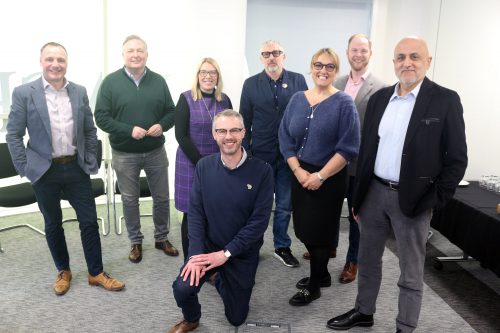Stability and risk mitigation remain key concerns for business leaders

Regional business leaders shared some of their most pressing concerns at TheBusinessDesk.com’s Outlook round table, hosted and supported by Blacks Solicitors.
Claire Webb, managing director of retail logistics firm Advanced Supply Chain Group, said supply chain volatility and security was a major concern for retailers.
“The approach to sourcing is 180 degrees from what it was,” she said. “They have a perfect storm of trying to manage gross margins, which are under pressure, increased shipping costs and volatility on lead times. Big businesses have gone from having to buy super-deep because sales were high and supply chains vulnerable. Now, if you’re long in any stock, it’s the wrong stock, it’s not selling.”
Finance and liquidity was a concern for Naveen Ahmed, founder and managing director of property and hospitality firm Parklane Group.
“Banks have virtually shut their doors to people of our sort of size. So we use funds more and more. I’ve got a big refinance coming up, and it’s been challenging to try and get it refinanced. There’s a liquidity issue in the marketplace, and that means that the costs are going up. That’s a risk for us.
“Private equity are the big players in the marketplace, buying in and competing against us. I see that as a massive risk to independence, because these guys have vast amounts of money. They’re just swallowing people up. I get lots of approaches to work for them, but I don’t want to be a hamster in a wheel.”
Paul Connell, founder of data analysts Open Innovations, agreed property finance was difficult. His firm has been working with academics at the Productivity Institute in Manchester. “They’ve done research to show that a lot of the property prior to the financial crisis, and prior to Covid, the money markets and international markets could not price risk outside London.
“Now they can’t understand the risk, so they can’t price the money. They don’t have enough data. They don’t understand it, so they’re not doing it. You can see in the data that they’ve stopped doing it until they get some more certainty.
“This leads into infrastructure and leads into planning. They can’t see as much confidence and certainty around.”
With mention of infrastructure, Blacks’ banking partner Richard Morton was keen to find out how attendees felt about the UK’s ability to deliver big projects.
“Whether you think HS2 was a good idea or not, we certainly wasted a lot of money on it,” he said. “I remember the [Leeds] supertram thing – when it was first mooted it was to be £190m. They’re talking about something similar now and, which is something like £2.5bn, which will never happen.”
Connell said Open Innovations has also been looking at this subject. Unlike France and Germany, in the UK the Government underwrote the project, he said. “There are loads of models elsewhere where private money was brought in and they held the risk, rather than the Government holding the risk.”
The problem was, he felt, that the Government’s decisions on big infrastructure were too political, rather than data driven.
Acknowledging major infrastructure matters were unlikely to be resolved soon, the table turned to the issues of risk mitigation in a stagnant economy.
Ben Priestley, chief finance officer of manufacturer Mansfield Pollard, which makes HVAC and filters for data companies, was optimistic. He said that although some supply costs remained high there was less volatility in supply chains, allowing better planning.
“We use a lot of galvanised steel, steel, aluminium, copper, et cetera. And our pricing structures have gone further and further out.
“Outside of copper, which has still got some level of volatility, we can now block out for either one project or three months without the risk that we had 12 months ago, even though some of those materials, like galv steel, are still expensive compared to what they were 12 months ago.”
In addition, he felt exports helped mitigate risk, but said how his firm used AI would have a major impact. In addition to increasing efficiency, he saw AI implementation as a defensive strategy. “I do think that if we don’t use it, someone else in our industry will, and if they do they are going to come after our marketplace.” he said. “So there’s no choice in that. But there are opportunities there.”
Nevertheless, the group felt the advantages of AI and automation were not universal and should not be overstated.
Darryl Short, managing director of mobile car service Smart Repairs put it most forcefully. His firm does use AI in the back end to help coordinate staff journeys, but he warned, “AI is not going to fix everything and we need to stop thinking that it will. There isn’t a silver bullet that’s going to fix everything. We need to have a proper, grown-up conversation where we say, yes it will help in this area, but don’t think it will fix this over here.”
Claire Webb said that while AI and automation might work at scale, with regular deliveries, it had difficulty coping with changes in work styles.
“It’s a real danger to take your eye off people and talent, particularly in my world of supply chain agility,” she said. “Over the last five years, a number of times we’ve had to pivot to a whole new way of working. Once you’re heavily invested, if you’re in an automation infrastructure, you can’t pivot.”
Naveen Ahmed said he worried about the levels of redundancies over the next five years. “We were having a chat about this in our boardroom. You can see so many people being made redundant because AI just takes over. The marketing departments and various accounting and development functions – AI can do all of that. What will happen to the architects and everybody else? AI will be able to design a building better and quicker and cheaper than an architect.”
But AI would not be able to say how humans would react to buildings as architects could, said
Beckie Hart, Yorkshire and the Humber regional director for the Confederation of British Industry.
Nevertheless Hart, chair of the board of trustees for Hull Truck Theatre Company did see advantages for Ai in creative sectors, where it could aid in routine tasks, allowing creatives to concentrate on artistic endeavours.
“So much time is spent responding to Arts Council England’s investment principles, or in HR issues, finance issues. AI can really help there because it allows people who are really passionate about delivering cultural things to get on with the things they’re passionate about.”
This is the second of two reports from the Outlook 2024 round table. The first looked at the macro economy and challenges in energy and supply costs.









